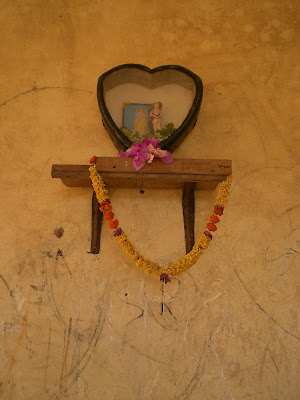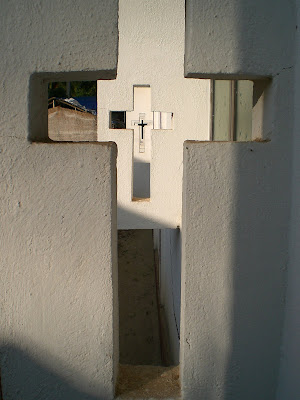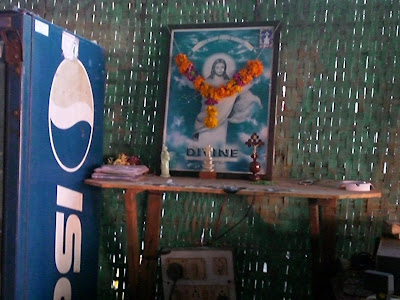At The Beach, Still
 Cabo de Rama fortress wall
Cabo de Rama fortress wall
Reaching Goa, mixing sand and water with warmth, you’d think my days would have been full of savored contentments. The weather was perfect; during the daytime it was hot in the sun, but not so hot that you couldn’t cool down in the sea or spend comfortable hours with a book in the shade of a palm, and in the evening, after showering off the saltwater day, it was just cool enough to be comfortable in linen pants, a t-shirt, and my white pashmina, a fifty-fifty blend of finely spun wool and silk. On the first beach I inhabited, Palolem, I prepared for sleep in my ocean-front, plywood hut by folding my large Rajasthani sheet of leafing blue paisleys block-printed by hand on white cotton in half on my single bed and then overlapping the white pashmina with a heavier, pure wool, black one. They were each a bit longer than the bed and three-quarters the width, so together they formed a covering just heavy enough to keep out the 4am chill. I lay down with the sound of the waves grasping regularly at the sand about 10 yards from my porch, and as I meandered off to sleep I often asked myself why, in the midst of this idyllic place, I felt so anxious.
Aside from the unwanted attentions and unanswerable questions raised by my economic position in the community, I was tormented by (or tormented myself with) a discouragingly familiar problem. For as long as I can remember, a part of my mind has been constantly churning with the question of well-used time, and the churning itself has destroyed the capacity to use time well. Every activity is left undone or inattentively undertaken in the presence of my demand that it reveal its value instantly. Hoping to escape this self-defeating habit, I set myself only one rule before undertaking these months of travel; thou shalt have no other motivation for action than attraction. I hoped that by denying other motivations, like obligation, perfection, market value, or necessity, and acknowledging impulse as the only legitimate cause for action, I could escape the feeling that there is always something more valuable to do with my time than what I’m doing at any given moment. After all, if the only justification for an action is my wish to undertake it, then the only time that can truly be wasted is the time I spend on things that I don't want to do. There is still the problem of wanting to do more than one thing, but you have to start somewhere. Kooky, right, but I thought I'd give it a shot.
 Cabo de Rama
Cabo de RamaIt was easier to follow my commandment when I was moving frequently, because the rigours of getting from one place to another were accomplishments in themselves, and there were a variety of things to attract my eye and mind. But at a beach, where there isn’t much to “do” except relax and enjoy, I was again prey to the anxiety that whatever I do is slipping away nearly unnoticed because of my preoccupation with "doing something." After a few days on the beach, I was unable to enjoy anything because I couldn’t shake the thought that while I did one thing so many others waited. "If I lay in the sun too long I'll miss swimming. If I go swimming I won't have time to take a walk. If I eat now I may not be hungry at dinner time. This is a great book, but I'm missing a lovely day. If I swim now, then I'll have to take a shower, and I'll miss the sunset. If I take a nap now, then I won't be tired tonight, and then I'll stay up too late and oversleep in the morning." I know, tough decisions; the absurdity of spending any time at all agitated over how to best spend days set aside for nothing but leisure irritated me even more, and my frustration with myself only made the whole problem worse; my preoccupation colored my perception of the community I was living in, leaving me a double source of annoyance, myself and the people around me.
 Welcome
WelcomeSoon enough, I was thoroughly paralyzed and apprehensive, so I asked myself, or rather the parishioners ranged in the pews of my imagination, what the hell was wrong with me. Somebody, perhaps a grumpy uncle, or grandparent, delivered the stern admonition that I was simply doing too much “navel gazing.” Whoever this character is, he’s never suggested a positive remedy for any condition, but I sometimes tend towards agreement. By this point in my acquaintance with myself I've accepted the fact that there are multiple characters living in my head, so I directed the question to a kindlier member, instead of putting it to the mass, where the least considerate are always the quickest and the loudest. She responded in a white-haired, widow’s way, “but my dear, Christmas has come and gone; the New Year is approaching, and you are all alone,” her protective instincts guiding me away from my own trove of half-formed fears and toward a good, solid story, allowing me once again to mine nature and its signs for an explanation.
 Margao church
Margao churchWell, you can tell from my last post how inconclusive that line of thought turned out to be; after chasing my own tail for three weeks and failing to scold myself into a better mood, I finally gave up on thinking myself out of my hole and remembered the approach that has always worked best, action. One morning I packed my bag, hired a boat-taxi, and travelled 20 minutes northward to the next habitable beach. Agonda's shoreline is longer and straighter than Palolem's small-lobed-ear shaped beach, and the waves are less gentle. It may be because of Agonda's austerity that it is far less populated. There are only two resident hawkers (both selling sarongs) on the whole great, long stretch of sand, and the beach huts are spread out among palms and some sort of native evergreen thickly populated with large crows. Slightly further back from the beachfront lodgings are brick and plaster bungalows, and behind those is the main (and only) street of the small village. The village is populated by generally friendly, healthy locals and long-term foreign residents who are both models of and/or cautionary tales against relaxation.
 Fatima
FatimaWhen I got off the boat, I spent a few hours walking the length of the beach checking out the various forms of lodging. Finally, resolved to have my own shower and stable quarters after weeks of living in a shifty hut without a bathroom, I settled in a room slightly back from the beach facing a dirt lot full of coconut palms. All 4 of the rooms in the lime-green rectangular building were occupied; I was on the end, Elad, the young Israeli man of banana lassi fame was in the next room, and 2 older Israeli men occupied the last 2 rooms. On the other side of the coconut grove sat a few other buildings. One of them housed Elad's sister and her friend, and another housed Daniel, a writer from Denver. Within a few days of settling in Agonda, I had more conversations than I had in 3 weeks in Palolem; I was living in a neighborhood, make-shift and temporary though it was, and I started to feel better.
 pig and bird in the coconuts
pig and bird in the coconuts Still, when my 32nd birthday came, 3 days after my arrival in Agonda, I left my room in the middle of the night, went to the beach, sat down, and wept in an excess of self-pity. I had heard through the grapevine that Daniel travelled with a library, so the next day I went to his room. I asked him to lend me something (at a loss for a better word) "uplifting." Pulling a suitcase from underneath his bed and unpacking its contents, it turned out that "happy" books are not Daniel's specialty; but I simply, at that time, could not read any Kafka or Camus. After long deliberation, I chose a handsomely bound collection of the works of John Steinbeck, from which Daniel recommended his second novel, To A God Unknown. Now, this book wouldn't be my recommendation to someone who wanted to exit a serious mood, but I wasn't looking for the paper version of a Hollywood movie either. I didn't know what I was looking for, and I figured that Steinbeck would at least provide the refuge of a familiar voice. I was right; although the novel itself is violent and disturbing, the narrator's voice has a solid, calm (if ominous) rhythm, and I found, as I often do when I read, unexpected parallels with my present context. Printed at the beginning of the book is a hymn from the Rig Veda, a sacred Hindu text, and the novel's title is taken from these lines. The story is set among homesteaders in California where a priest, Father Angelo, observes the incorporation of the native religion into Christianity in much the same style attested to by the strange Jesus shrines here in southern India.
 Cabo de Rama Jesus, or saint, or something
Cabo de Rama Jesus, or saint, or something During this trip I've been intentionally selective about my literature, only undertaking things that demand my attention through one coincidence or another, in order to avoid reading simply for the sake of distraction, and the approach has paid off; every time I've opened something, I've found some serendipitous connection. The other thing I picked up in Agonda was an outdated, abandoned copy of Vanity Fair, a glossy I always enjoy, which happened to have (in the wake of Mel Gibson's bad behaviour) an article (which I probably would have skipped a week earlier) about American anti-semitism. There are tons of Israelis travelling in India, usually in large, boisterous, cliquish and impenetrable groups. Elad was a rare free-agent; he had come to India for 6 weeks to join his sister, Shiri, who is midway through a much longer stay. On my first day in Agonda, he and I happened to be entering our rooms at the same time, and we exchanged courtesies.
While travelling, I've gotten in the habit of lying about where I'm from; when someone asks, I just pick someplace in America, because I'm not from anywhere at the moment, and I never have had a hometown. It's just a form of polite greeting among travelers, and a form of wealth assesment from many Indians (in which case I don't pick someplace in America). I figure most people don't want to hear the 10 minute list of places I've lived, so I often say I'm from New York, both because I plan to live there next and because everyone, everywhere, knows where it is (with the exception of my waiter last night, who asked me if New York is part of Europe). New York was the answer I gave Elad, but instead of letting it go at that he asked "where in New York?" "Uh, Brooklyn" I replied. "Oh, where in Brooklyn?" Not prepared for his alertness, it took me a second to come up with, "Ummm...Park Slope." That satisfied him for the moment, but we had lunch together the next day. About an hour in, he asked me a question about New York. At that point, I had to admit that I've never actually lived there. To my amazement, he was slightly pissed off about the lie; and to my further surprise, I was revived by the evidence that he actually cared.
 Fatima's shrine at Cabo de Rama
Fatima's shrine at Cabo de RamaMaybe what I had been needing to bring me out of my month-long malaise was some companionship. I had a few long and interesting conversations with Daniel, from whom I learned that people can get even more ridiculously, needlessly paralyzed than me, and spent nearly 2 weeks in the company of Elad, Shiri, and their mother Irit, who arrived in Agonda shortly after me; it was nice to have a mom around, even if she wasn't mine. I don't know if my lifted spirits came about just because a person can only go around like that for so long, because of the relaxed atmosphere in Agonda, or because of the people I lucked across, but by the end of my first week there I was happy to accomplish absolutely nothing for days on end.
 Goa rice paddies
Goa rice paddiesDuring all that contented sitting around I learned a lot about the habits of pigs, which thouroughly tainted my enjoyment of pepperoni and bratwurst, and far too much about the mating activities of dogs, which I will never think of in quite the same way. I rented a bike for a few days and saw some of the inland towns of Goa, and visited the coastal Portuguese fort,Cabo de Rama twice, once with Elad and family and once with Talia. Near the end of my stay, Talia and I rented a kayak, learning to navigate waves for an hour, and then stopping to watch the sunset, laying on the kayak, legs trailing in the warm water. Before Agonda, I had tried a hammock maybe 3 times in my entire life, and each time I'd found it irritating and uncomfortable, because it's hard to do anything sitting in one; so when Elad bought a hammock and suggested I buy one too, I declined. After he tied it up on his porch I tried it out, and a few days later I bought one of my own. Now, I'm carrying it in my backpack and I tie it up wherever I can. I consider my hours swinging in a hammock without thinking I should be doing something else my chief accomplishment for the month of January; I'm grateful to Elad for the suggestion, and for caring where I'm from on a day when I didn't even care that much myself.











